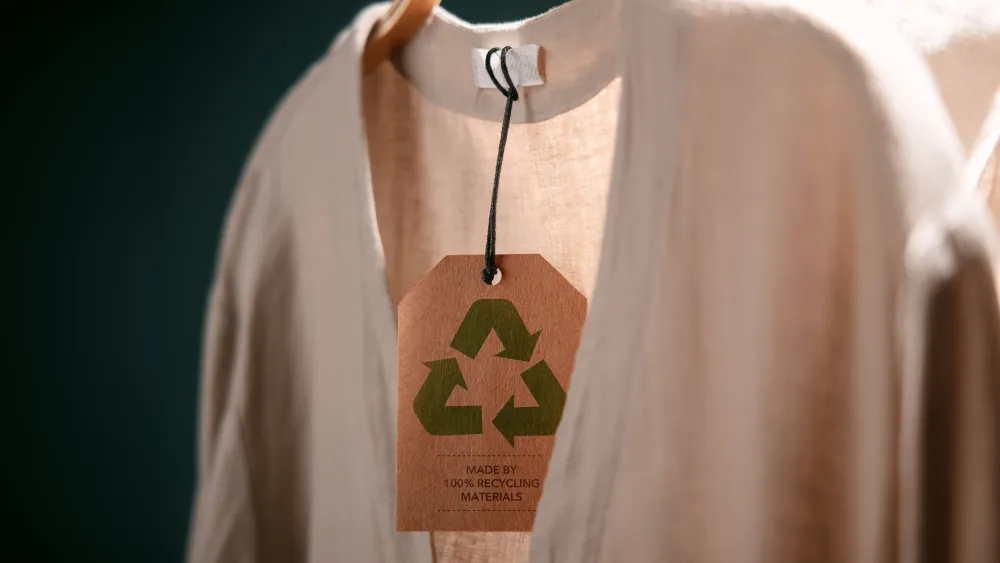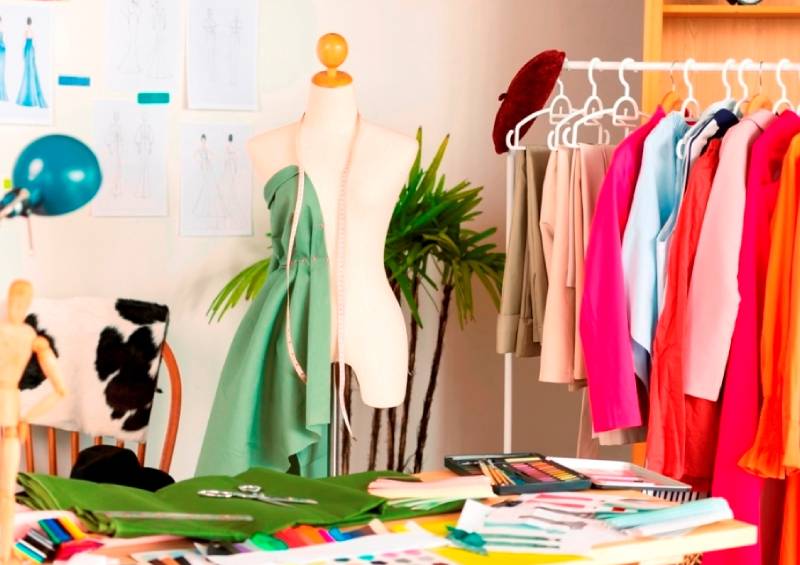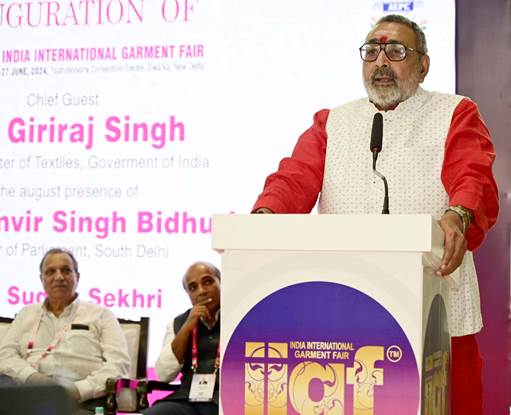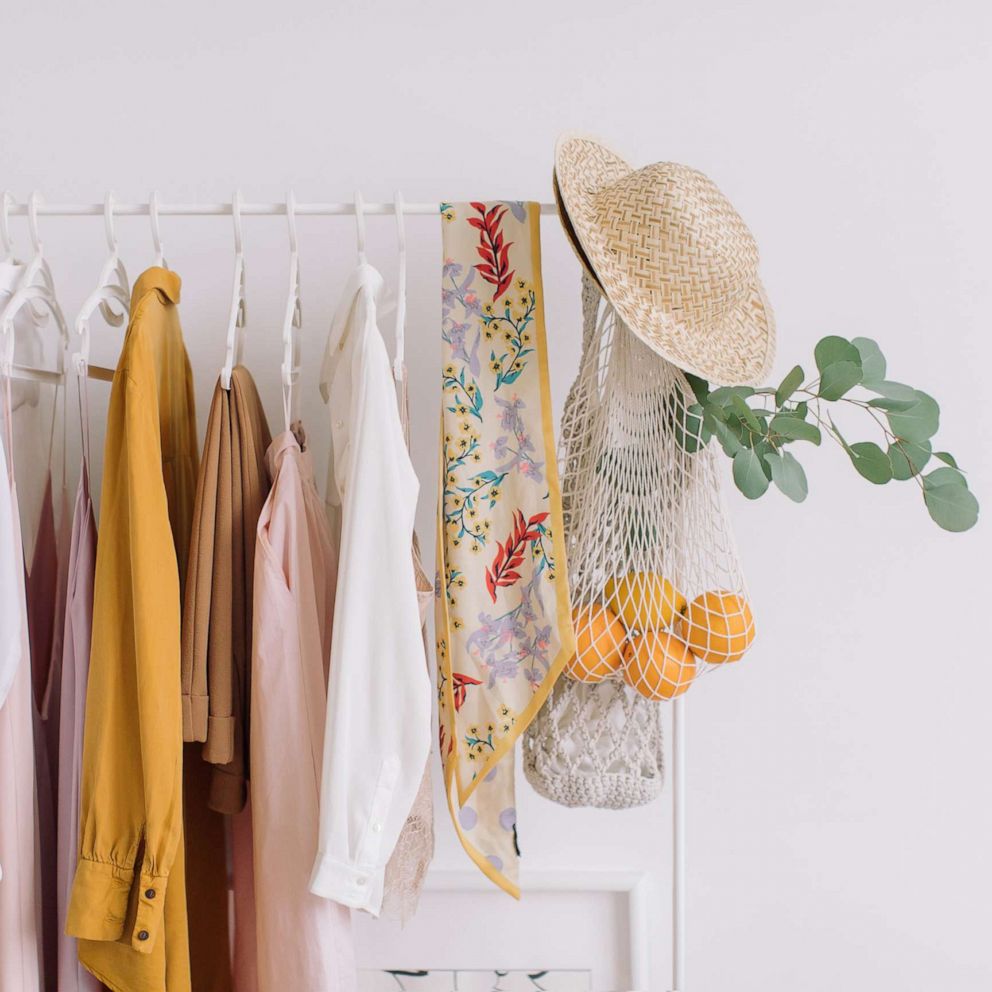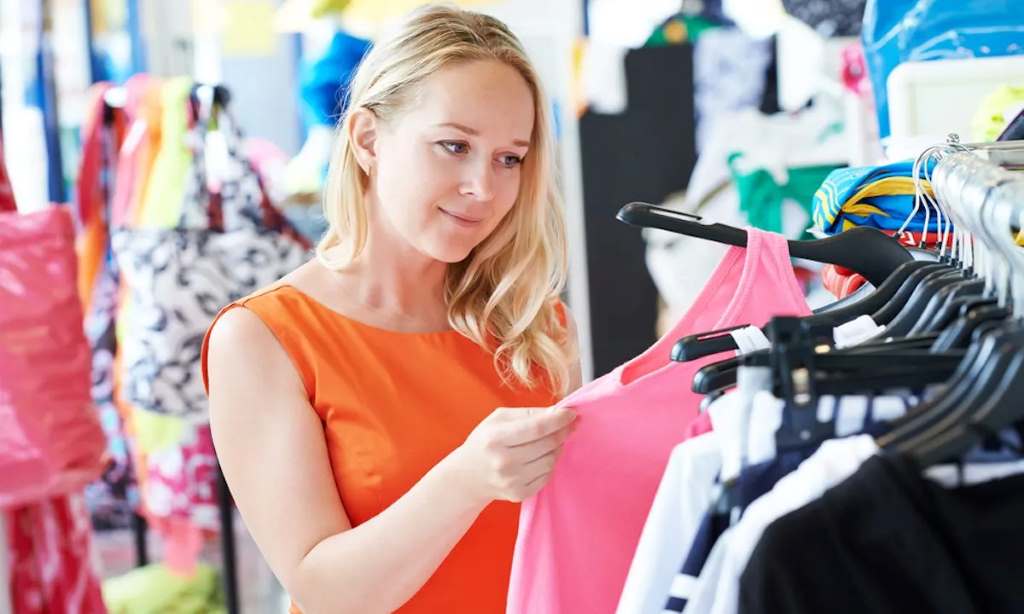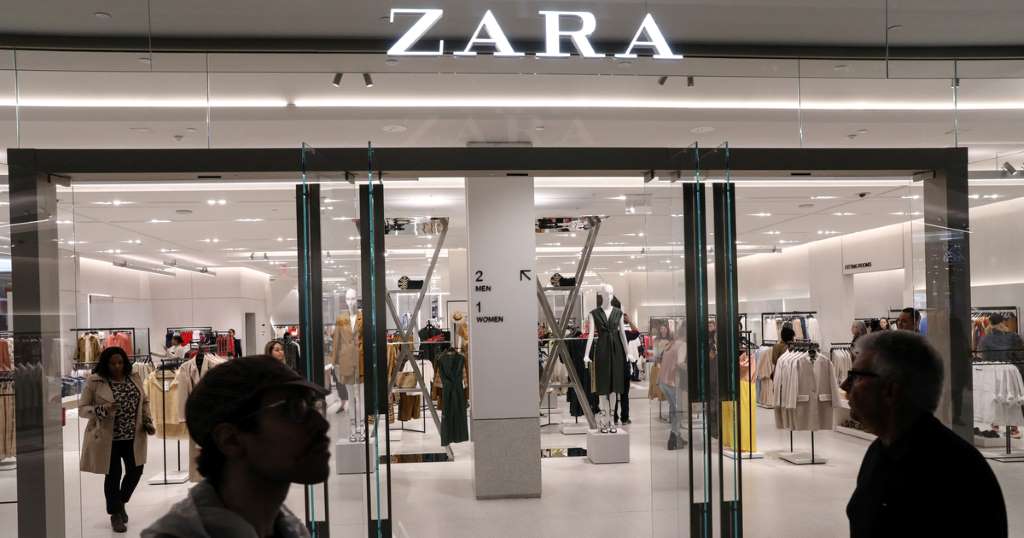FW

India's ambitious plan to reach $100 billion in textile and apparel exports by 2030 faces challenges but holds promise. This includes $40 billion from apparel exports.
As per WTO 2023 statistics, India is the second-largest textile exporter globally (7.4 per cent market share) but the fifth-largest garment exporter (3.1 per cent market share. The status is that the garment exports have stagnated around $14-17 billion for the past five years, with a 10.2 per cent decline in FY 2023-24. However, the textile sector fared slightly better with a 12.5 per cent decline in exports in 2022.
Indeed, there are many challenges on way to achieving this goal.
Competitiveness: Countries like Bangladesh and Vietnam enjoy tariff advantages, making Indian exports less competitive.
Limited MMF production: India's strength lies in cotton, but it lags in man-made fibers, a growing segment.
Skill gaps and labor issues: Minimum wages are low and poorly enforced, impacting worker well-being and productivity. Additionally, there's a need for skill development in the workforce.
Disruptions: The COVID-19 pandemic disrupted supply chains, impacting the industry's recovery.
Government initiatives
The Indian government is implementing various schemes to boost the industry.
Production Linked Incentive (PLI) scheme: This scheme incentivizes production of man-made fibers and technical textiles.
PM Mega Integrated Textile Region and Apparel (PM MITRA) parks: These parks aim to create integrated textile manufacturing facilities with economies of scale.
Free Trade Agreements (FTAs): Recent FTAs with UAE and Australia and ongoing negotiations with UK and EU aim to reduce trade barriers and increase market access.
Rebate schemes: Extensions of schemes like RoSCTL provide financial benefits to garment and apparel exporters.
Table: Stats at a glance
Target: $100 billion in textile and apparel exports by 2030.
Current exports: $14.53 billion in garments and $19.4 billion in textiles (FY 2023-24).
Market share: 7.4 per cent in textiles (world's second largest), 3.1 per cent in garments (world's fifth largest).
Vision 2030 recognizes the growing demand for sustainable textiles. Initiatives include promoting recycling facilities to reduce waste; encouraging resource-efficient processes like zero liquid discharge and use of renewable energy; Promoting adherence to environmental, social, and governance best practices.
Industry leaders emphasize the need for automation and digitalization to improve efficiency; skill development to create a future-ready workforce; embracing global best practices to enhance competitiveness.
Achieving ‘Vision 2030’, a realistic goal
While the $100 billion target might be challenging, significant progress is certainly achievable. The government's supportive measures, industry initiatives, and a focus on sustainability can propel India's textile and apparel sector forward. Success will depend on effectively addressing competitiveness issues, upgrading infrastructure, and ensuring a skilled and fairly compensated workforce. India's rich textile heritage, strong raw material base, and large workforce position it well to become a global leader but achieving Vision 2030 will require a concerted effort from all stakeholders.
A renowned name in the textile industry and a part of the VXL Group, VXLRT aims to showcase its ring travelers range at Texfair 2024 in Coimbatore..
VXLRT offers a comprehensive range of ring travellers, such as ‘Alpha’, ‘Ultimate’, ‘Ultimate +’, ‘Ulti-Fein’, ‘Startech’, ‘Ace Jet’, ‘Astra’, and the ‘Plus Series’. “These rings are renowned globally for their quality and reliability, catering to various needs, says N Damodharan, Managing Director
VXL Systems, the sister concern of VXLRT offers waste collection systems that incorporate Industry 4.0 and IoT features, along with a unique auto-cleaning and suction arrangement. These systems provide automation from the blow room to the ring frame, adds Damodharan.
The company also offers an auto baling system that supports centralised baling for multiple mills within a single compound and features IoT for remote monitoring from the group’s office, notes R Govindaraju, Managing Director.
VXLRT has been a consistent participant at Texfair since its inception. This exhibition allows the company to interact with customers from various regions and exchange ideas. with them, Govindaraju emphasises. The fiscal year 2023-24 resulted in a slight dip in the company’s profit. However, it remains optimistic for the future, he notes.
Thanks to its focus on R&D and innovation, VXLRT has established a strong global presence. Its products are in demand in key markets like China, Bangladesh, Uzbekistan, Thailand, Vietnam, and Indonesia.
With the rising popularity of the sport, golf, many UK-based fashion brands are venturing into the golf apparel market
Prominent amongst these is the brand Lee, a denim pioneer for the last 130 years. Known for its iconic blue jeans, Lee recently launched its Lee Golf series.
This new range features short-sleeve polo shirts, flat-front chino shorts, and 5-pocket pants designed for golfers and enthusiasts. Available at Walmart and the Lee website, the collection is priced affordably between $20 and $48. The collection combines great performance features for on the course with timeless styles for off the course, says Jimmy Shafer, Senior Vice President, Lee.
Being involved in the sport golf since 2019, DraftKings is a well-known name in sports betting and gaming technology. The company has now launched its own glof apparel range titled, the DraftKings Fairway Collection. Featuring polo shirts, quarter zips and hoodies, the collection is priced in the range of $60-$70l. Available on the DK Shop website, this collection marks the beginning of DraftKings' foray into golf fashion, with plans to release co-branded apparel with Malbon and other golf industry brands later this year.
UK heritage menswear brand, Ben Sherman has also expanded into sports apparel with its Ben Sherman Golf SS24 collection. Blending classic style with high-performance features, the collection includes sport-fit polos, quarter-zip fleeces, and 4-way stretch tech pants and shorts, priced between $80 and $90. Ben Sherman partnered with PGA Tour golfer Denny McCarthy as an ambassador for the collection. Tim Reid, Executive Vice President - Fashion and Lifestyle, Marquee Brands, the parent company of Ben Sherman avers, the brand’s expansion into golf apparel reflects a broader trend of merging fashion with sports, catering to both professional and casual players.
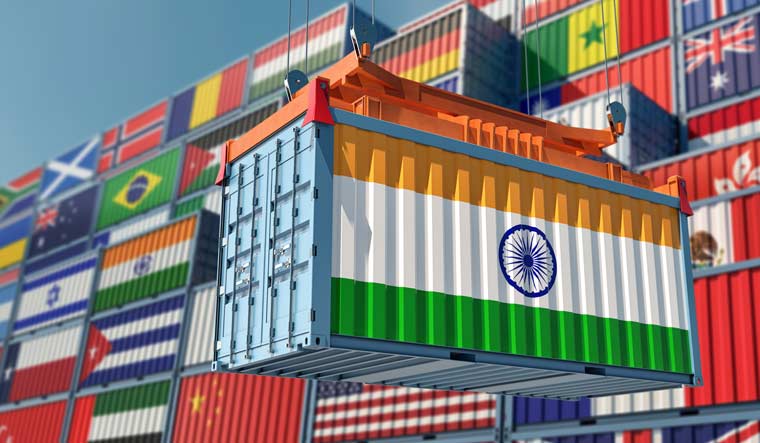
The global apparel market is presents a complex picture with declining imports in major regions like the US and EU, contrasting with a rise in Indian apparel exports reveals Wazir Advisors’ June 2024 ‘Apparel trade scenario in key global markets and India’ report.
Falling imports, rising exports, a balancing act
Wazir Advisors’ monthly report reveals apparel imports across key markets except the UK witnessed a year-on-year decline in April 2024. This aligns with the decline in retailer inventory data, indicating efforts to clear out existing stock. However, this trend contradicts the rise in US consumer confidence, which could signal pent-up demand waiting to be unleashed. Several factors could have led to this scenario.
The retailer inventory data suggests high inventory levels in previous quarters. For example, the Q1 inventory value of Walmart is $55.4 billion and the year-to-date (YTD) change is -3 per cent. Similarly Target’s inventory value in Q1 is $11.7 billion and YTD is -7 per cent. Kohl’s inventory value for the same quarter is $3.1 billion with -13 per cent change. In Gap’s case the value is $2.0 billion with -15 per cent change and VF Corp’s inventory value is $1.8 billion with -23 per cent change. The significant decline in inventory value at major US retailers during Q1 2024 reflects their cautious approach to managing stock levels.
Another factor leading to a drop in imports in key markets is retailers exercising caution amidst global economic uncertainties. Conversely, India's apparel exports in May 2024 showed a significant 17 per cent YoY growth. This positive trend might be driven by increased global demand for Indian apparel, potentially due to competitive pricing or specific product categories. Diversification of export markets by Indian apparel manufacturers.
However, India’s apparel exports growth is overshadowed by a decline in exports to Bangladesh, a major competitor. The flat export to China, a dominant market, further complicates the picture.
Discrepancy in consumer confidence and retail sales
US consumer confidence rose by 5 per cent in April 2024, indicating a potential rise in consumer spending. However, US apparel store sales in May 2024 were estimated to be 1 per cent lower compared to the previous year. This inconsistency suggests consumers might be prioritizing other purchases over apparel. Another reason could be a shift towards online shopping.
While US home furnishing stores experienced a surprising 4 per cent increase in May 2024, apparel stores witnessed a slight decline. Similarly, UK apparel store sales are down. This inconsistency highlights a shift in consumer spending behavior, possibly towards home goods over apparel. However, the strong growth in UK online clothing sales suggests a potential migration towards e-commerce channels.
Regional variations
The UK stands out with a rise in apparel imports at 14 per cent YoY despite a 3 per cent decline in apparel store sales. This could imply UK retailers are stocking up in anticipation of future demand. There is changing consumer preferences within the UK market. Interestingly,
While US online clothing and accessories sales witnessed a slight decline in Q1 2024, UK online clothing sales experienced a 7 per cent growth. This suggests the e-commerce apparel market might be stabilizing after a period of rapid growth.
The data points towards a global apparel market in transition. Declining imports and high inventory levels indicate a period of adjustment. However, rising Indian exports and a potential shift towards online shopping suggest opportunities for growth. It's crucial to monitor consumer spending patterns and regional variations to understand the evolving dynamics of this industry.
The Karl Mayer Group, a leading textile machinery and plant engineering company, has secured a significant legal victory in China against Fujian Xin Gang Textile Machinery Co. Ltd. This triumph marks a crucial step in the fight against product piracy. After a lengthy legal battle initiated in 2021, the Supreme People's Court of China ruled in favor of the Karl Mayer Group in May 2024.
The dispute centered on a patented system for heating the carrying-lever shaft of Tricot and Raschel machines, a critical innovation allowing the machines to adjust to varying ambient temperatures. This patent, granted in China in November 2011, underpins the superior performance of Karl Mayer’s technology.
Fujian Xin Gang Textile's attempt to cancel the patent was dismissed, and the court ordered the company to cease production, sales, and advertising of the infringing machines. A fine was also imposed.
Karl Mayer's victory underscores the importance of protecting intellectual property and sends a clear message to the market that copying innovations is futile. Zhen Kong, General Manager of Karl Mayer (China), emphasized the significance of the ruling, noting that it strengthens legal certainty in competition in China. This is particularly crucial for companies dedicated to innovation.
The decision ensures Karl Mayer's competitive edge in the vital Chinese market, reinforcing the company's global leadership in textile machinery.
Tonello has unveiled its new website, ‘Inspiring,’ offering a fresh perspective on fashion and denim. This digital platform embodies the company's creative vision, connecting brands, professionals, companies, and students. It emphasizes the synergy between art and technology, serving as a collaborative space for innovation and creativity.
The website, inspiring.tonello.com, is more than a portal; it's a journey into Tonello's world. Divided into five sections—Essence, Dossier, Journal, The Story, and Collections - each part uniquely showcases the brand's commitment to innovation and sustainability. "Essence" introduces the site's core concept, while "Journal" features interviews, updates on research, and new technological advancements. "Dossier" offers practical tips on denim care and sustainable dyeing methods.
"The Story" narrates Tonello's history and the evolution of denim through various decades, blending fashion, society, and pop culture. "Collections" highlights exclusive capsule collections created with top designers, showcasing cutting-edge research and experimentation.
Inspiring is not just a website; it’s a dynamic platform designed to inspire and engage. It prioritizes humanity and creativity, positioning Tonello as "The Inspiring Company." Visit Inspiring to explore this innovative and sustainable fashion journey.
From Jan-April’24, Bangladesh’s RMG exports to the European Union fell by 9.85 per cent to €6.01 billion from €6.67 billion in the same period of 2023, according to Eurostat, the statistical office of the European Union.
While managing to mitigate the negative growth in its apparel exports to the EU, Bangladesh still underperformed compared to its competitors. The country attributed the lag in its performance to a severe energy crisis, high utility costs, increased production costs, long lead times, and cumbersome customs procedures, similar to the challenges faced in the US market.
Bangladesh’s apparel exports to the EU were further impacted an overall decline in apparel imports by the EU due to the global economic slowdown, as per Eurostat data. From Jan-Apr’24, Bangladesh’s knitwear exports to the EU fell to €3.38 billion from €3.88 billion in the same period of 2023. Similarly, woven garment exports dropped to €2.64 billion Y-o-Y from €2.79 billion.
Clothing imports by the EU from various countries declined by 6.28 per cent to €26.41 billion in January-April 2024 from €28.19 billion in the same period of 2023. The EU imported apparel worth €6.54 billion from China in January-April 2024, a slight decline of 1.81 per cent from €6.66 billion in 2023. Imports from Turkey decreased by 11.84 per cent to €3.03 billion from €3.44 billion. India’s exports to the EU fell by 10.74 per cent to €1.53 billion from €1.71 billion. Vietnam’s exports to the EU dropped by 6.25 per cent to €1.17 billion from €1.25 billion.
Additionally, Bangladesh experienced a significant decline of over 14 per cent in apparel exports to the US, the country’s largest export destination, earning $2.30 billion in the January-April period of 2024, according to the US Department of Commerce’s Office of Textiles and Apparel.
Fashion and textile tradeshow, ‘Sourced Sri Lanka’ concluded successfully with a network reception held by the High Commission of Sri Lanka on June 17 at the Royal Horticultural Hall in the UK.
Marking its debut in the UK after 22 years, the tradeshow highlighted the best of Sri Lankan fashion and textiles with 80 exhibition stalls. This unique event offered UK buyers and fashion enthusiasts a direct engagement opportunity with Sri Lankan manufacturers and designers.
The tradeshow was organised collaboratively by the Sri Lanka Export Development Board (EDB), Sri Lanka Apparel Sourcing Association (SLASA), and Joint Apparel Association Forum (JAAF), in partnership with the High Commission of Sri Lanka.
The event featured panel discussions with industry leaders, fashion shows, and the launch of ‘Your Vital Island.’
Rohita Bollogama, High Commissioner, Sri Lanka, remarks, the tradeshow launched Sri Lanka’s National Export Brand to present the country’s exports in the international markets through an integrated approach.
The new brand identity, ‘Your Vital Island,’ signifies the unique qualities of Sri Lankan products and the country's commitment to being a reliable sourcing destination, consistently delivering products that embody authenticity, sustainability, and competence, he adds.
Highlighting the significance of the event, Bollogama notes,the ‘Sourced Sri Lanka’ Road Show emphasised Sri Lanka’s dedication to excellence, sustainability, and innovation in the global fashion industry.
Facing regulatory pressures to meet the new sustainability and circularity standards set by the 2030 EU Green Deal, fashion brands and retailers are turning to the Future Fabrics Expo for solutions. The expo is being held at Magazine London from June 25-26.
The largest dedicated showcase for sourcing certified, sustainable, and responsibly produced textiles and materials, the Future Fabrics Expo is being attended by new fiber supplier, Hyosung who is exhibiting its range of eco-friendly textile solutions across recycled and bio-based categories, including its portfolio of certified sustainable regen elastane, nylon, and polyester fibres.
The expo will help Hyosung meet new customers, exchange new ideas and interact with industry experts, says Claire O’Neill, Director-Brand Marketing-Textiles, Hyosung. Focusing on renewable fibers from alternative feedstocks, the brands and retailers at the show are showing immense interest in Hyosung’s regen BIO elastane.
Hyosung was the first company to commercialise USDA and SGS certified bio-based elastane fibers made partly with renewable resources in 2022. Fibers from the brand were adopted by Pangaia in its activewear collections. For its collection, Pangaia combined bio-based elastane with its Hyosung regen BIO elastane, and Icebreaker, which blends the bio-based elastane with its signature merino wool.
As part of its corporate ESG commitment to achieve net zero by 2050 and support the wider textile industry in meeting evolving sustainability goals, Hyosung has partnered with sustainable materials leader Geno to begin construction of a plant in Vietnam. Starting in Q2, 2026, the plant will produce Bio BDO derived from sugarcane.
Hyosung’s partnership with Geno will establish the world’s first fully integrated manufacturing site for bio-based elastane, from renewable raw materials to fiber. This project aims to produce Bio BDO with an annual capacity of 50,000 tons by the second half of 2026, with plans to expand capacity to 200,000 tons/year to meet the expected industry demand for bio-based elastane.
To be held at the Port de Versailles, Paris from July 01-03, the Texworld and Apparel Sourcing fairs will bring together around 1,154 companies.
With nearly 530 exhibitors, Apparel Sourcing will closely match the approximately 570 exhibitors of Texworld, the textile and materials fair. Additionally, around 30 exhibitors will feature in the Denim zone, and 20 leather specialists will come together in the Leatherworld zone, which will also host a Leather Trend forum co-produced with Edizioni AF.
A highlight of this year’s event is the introduction of Yarn Expo, a space dedicated to yarns and fibers, echoing the biannual fair organized by Messe Frankfurt alongside Intertextile Shanghai. Yarn Expo will feature productions from China and India, as well as Pakistan and Taiwan.
This year, Apparel Sourcing will host 30 Chinese manufacturers, showcasing their own brands or producing white-label goods for European distributors. These exhibitors will be identified by a Chinese Brands Gallery logo. The accessories sector will also expand to include a range of jewelry and bags.
Dedicated to innovation, the Avantex zone will introduce a Designer Hub for meetings between designers and buyers, and a ReSources zone focused on sustainable innovation. The Near Sourcing Hub will offer proximity production solutions, featuring around 20 companies from Portugal, Turkey, and Serbia.
This edition will also host a series of thematic conferences to discuss the challenges and opportunities of digital product passport textiles items. It will also organise conferences on other topics including developing European regulations, the rise of African fashion, and the revaluation of textile products.

